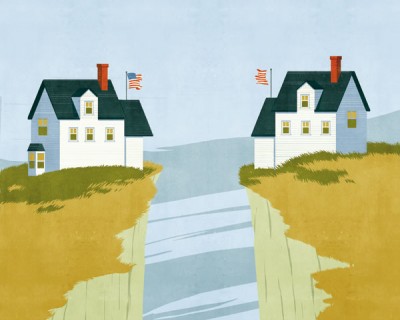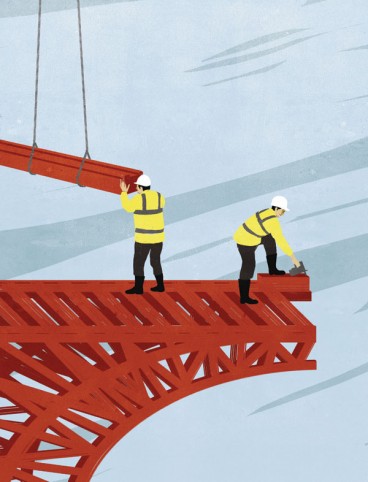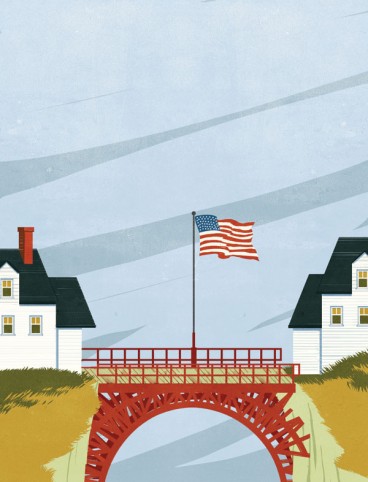America’s Painful Divide

“Politics ain’t beanbag,” said a Chicago humorist in 1895; it’s not a game for children. Ever since then the saying has been used to justify the rough-and-tumble nastiness of American politics. The competition always involves trickery and demagoguery, as politicians play fast and loose with the truth, using their inner press secretaries to portray themselves in the best possible light and their opponents as fools who would lead the country to ruin.
Why does it have to be this nasty? The country now seems polarized and embattled to the point of dysfunction. Up until a few years ago, there were some political scientists who claimed that the so-called culture war was limited to Washington, and that Americans had not in fact become more polarized in their attitudes toward most policy issues. But in the last twelve years Americans have begun to move further apart. There’s been a decline in the number of people calling themselves centrists or moderates (from 40 percent in 2000 down to 36 percent in 2011), a rise in the number of conservatives (from 38 percent to 41 percent), and a rise in the number of liberals (from 19 percent to 21 percent).
This shift to a more tribal mentality owes a lot to the stories we tell about ourselves. Everyone loves a good story, and these narratives are not necessarily true stories—they are simplified and selective reconstructions of the past, often connected to an idealized vision of the future. But even though life narratives are to some degree post hoc fabrications, they still influence people’s behavior, relationships, and mental health.
One such narrative, which the sociologist Christian Smith calls the “liberal progress narrative,” organizes much of the moral matrix of the American academic left. It goes like this:
Once upon a time, the vast majority of human persons suffered in societies that were unjust, unhealthy, repressive, and oppressive. These traditional societies were reprehensible because of their deep-rooted inequality, exploitation, and irrational traditionalism. … But the noble human aspiration for autonomy, equality, and prosperity struggled mightily against the forces of misery and oppression, and eventually succeeded in establishing modern, liberal, democratic, capitalist, welfare societies. While modern social conditions hold the potential to maximize the individual freedom and pleasure of all, there is much work to be done to dismantle the powerful vestiges of inequality, exploitation, and repression. This struggle for the good society in which individuals are equal and free to pursue their self-defined happiness is the one mission truly worth dedicating one’s life to achieving.
This narrative may not mesh perfectly with the moral matrices of the left in European countries (where, for example, there is more distrust of capitalism). Nonetheless, its general plotline should be recognizable to leftists everywhere. It’s a heroic liberation narrative. Authority, hierarchy, power, and tradition are the chains that must be broken to free the “noble aspirations” of the victims.
Contrast that narrative to one for modern conservatism. The clinical psychologist Drew Westen in his book The Political Brain extracts the master narrative that was implicit, and sometimes explicit, in the major speeches of Ronald Reagan:
Once upon a time, America was a shining beacon. Then liberals came along and erected an enormous federal bureaucracy that handcuffed the invisible hand of the free market. They subverted our traditional American values and opposed God and faith at every step of the way. … Instead of requiring that people work for a living, they siphoned money from hardworking Americans and gave it to Cadillac-driving drug addicts and welfare queens. … Instead of adhering to traditional American values of family, fidelity, and personal responsibility, they encouraged a feminist agenda that undermined traditional family roles. … Instead of projecting strength to those who would do evil around the world, they cut military budgets, disrespected our soldiers in uniform, burned our flag, and chose negotiation and multilateralism. … Then Americans decided to take their country back from those who sought to undermine it.
The two narratives are as opposed as could be. But research shows that the obstacles to empathy are not symmetrical. Even though conservatives score slightly lower on measures of empathy and may therefore be less moved by a story about suffering and oppression, they can still recognize that it is awful to be kept in chains. And even though many conservatives opposed some of the great liberations of the twentieth century—of women, sweatshop workers, African Americans, and gay people—they have applauded others, such as the liberation of Eastern Europe from communist oppression.
But when liberals try to understand the Reagan narrative, they have a harder time. Many in the audience actively reject these concerns as immoral. Loyalty to a group is the basis of racism and exclusion, they say. Authority is oppression. Religion is used to suppress female sexuality and justify homophobia.
John Lennon captured a common liberal dream in his haunting song “Imagine.” Imagine if there were no countries, and no religion too. If we could just erase the borders and boundaries that divide us, then the world would “be as one.” It’s a vision of heaven for liberals, but conservatives believe it would quickly descend into hell.

As a one-time liberal atheist, I’ve come to believe, based on my own research, that conservatives are onto something. They understand the importance of what I’ll call “moral capital.” (Please note that I am praising conservative intellectuals, not the Republican Party.) Capital, in economics, refers to the resources that allow a person or firm to produce goods or services. There’s financial capital (money in the bank), physical capital (such as a wrench or a factory), and human capital (such as a well-trained sales force). When everything else is equal, a firm with more of any kind of capital will outcompete a firm with less. We can define moral capital as the resources that sustain a moral community. More specifically, moral capital refers to the degree to which a community possesses interlocking sets of values and practices that mesh well with evolved psychological mechanisms and thereby enable the community to regulate selfishness and make cooperation possible.
What does it take to sustain moral capital? Is it enough to just link people together in healthy and trusting relationships? Will that lead to good behavior for years to come?
If you believe that people are inherently good, and that they flourish when constraints and divisions are removed, then yes, that may be sufficient. But conservatives generally take a very different view of human nature. They believe that people need external structures or constraints in order to behave well, cooperate, and thrive. These external constraints include laws, institutions, customs, traditions, nations, and religions.
Large-scale human societies are nearly miraculous achievements. Our complicated moral psychology co-evolved with our religions and our other cultural inventions (such as tribes and agriculture) to get us where we are today. We need groups, we love groups, and we develop our virtues in groups, even though those groups necessarily exclude nonmembers. Conservatives fear that if you destroy all groups and dissolve all internal structure, you destroy your moral capital.
This, I believe, is the fundamental blind spot of the left. It explains why liberal reforms so often backfire, and why communist revolutions usually end up in despotism. Left-wing reformers often overreach, change too many things too quickly, and reduce the stock of moral capital inadvertently. Conversely, while conservatives do a better job of preserving moral capital, they often fail to notice certain classes of victims, fail to limit the predations of certain powerful interests, and fail to see the need to change or update institutions as times change.
The third-century Persian prophet Mani preached that the world is the battleground between the forces of absolute goodness and the forces of absolute evil. His preaching developed into Manichaeism, a religion that spread throughout the Middle East and influenced Western thinking. Unfortunately, the rising rancor and polarization between liberals and conservatives has turned our politicians into Manichaean priests. Compromise is a sin. God and the devil don’t issue many bipartisan proclamations, and neither do our politicians.
America’s political class has become far more Manichaean since the early 1990s. Before 1995, congressmen from both parties attended many of the same social events on weekends; their spouses became friends; their children played on the same sports teams. But nowadays most congressmen fly to Washington on Monday night, huddle with their teammates and do battle for three days, and then fly home on Thursday night. Cross-party friendships are disappearing; Manichaeism and scorched Earth politics are increasing.

I don’t know how Americans can convince their legislators to move their families to Washington, and I don’t know if even that change would revive cross-party friendships in today’s poisoned atmosphere, but anything we can do to cultivate more positive social connections might also alter behavior. Other structural changes that might reduce Manichaeism include changing the ways that primary elections are run, the ways that electoral districts are drawn, and the ways that candidates raise money for their campaigns.
The problem is not just limited to politicians. Technology and changing residential patterns have allowed each of us to isolate ourselves within cocoons of like-minded individuals. In 1976, only 27 percent of Americans lived in “landslide counties”—counties that voted either Democratic or Republican by a margin of 20 percent or more. But the number has risen steadily; in 2008, 48 percent of Americans lived in a landslide county. Our counties and towns are becoming increasingly segregated into “lifestyle enclaves,” in which ways of voting, eating, working, and worshipping are increasingly aligned. If you find yourself in a Whole Foods store, there’s an 89 percent chance that the county surrounding you voted for Barack Obama. If you want to find Republicans, go to a county that contains a Cracker Barrel restaurant (62 percent of these counties went for McCain).
Morality binds and blinds. This is not just something that happens to people on the other side. We all get sucked into tribal moral communities. We think the other side is blind to truth, reason, science, and common sense, but in fact everyone goes blind when talking about what they hold sacred. So if you really want to open your mind, open your heart first. If you can have at least one friendly interaction with a member of the “other” group, you’ll find it far easier to listen to what they’re saying, and maybe even see a controversial issue in a new light.
The next time you find yourself seated beside someone from “another” group, give it a try. Don’t just jump right in. Don’t bring up morality until you’ve found a few points of commonality or in some other way established a bit of trust. And when you do bring up issues of morality, try to start with some praise or a sincere expression of interest.
We’re all stuck here for a while, so let’s try to work it out.
To view a video of Jonathan Haidt with journalist Bill Moyers, visit saturdayeveningpost.com/haidt.
An excerpt from The Righteous Mind by Jonathan Haidt. © 2012 by Jonathan Haidt. Published by arrangement with Pantheon Books, an imprint of The Knopf Doubleday Publishing Group, a division of Random House, Inc.